CELLECT is what this year’s iGEM team from Freiburg, consisting of 10 bachelor students, calls the system they spent multiple months developing and testing. The system is comprised of DNA and mRNA elements that, when inserted into bacteria, are supposed to increase the genetically engineered production of drugs or other molecules. The team is now planning the next steps towards the practical application of the system they devised.


Gold Medal and further awards for the iGEM Team Freiburg
The student team from the University of Freiburg succeeded at the international iGEM competition for synthetic biology
iGEM stands for ‘international Genetically Engineered Machine’. The name implies the focus of the competition: developments in the field of synthetic biology. It is directed at high school and university students with over 400 international participating teams. The big final event, the ‘Grand Jamboree’ took place in November in Paris. It was there that the team from Freiburg won a gold medal for special excellence, nominations in various categories, and a placement in the top 10 teams in their age group for the project CELLECT.
Team member Melita Dyla wrote the following report.
Join the 2024 iGEM team Freiburg
If you study in Freiburg and want to participate next year, contact igem2024(at)cibss.uni-freiburg.de. Applications for the team of 2024 are possible until the end of 2023 (30.12.2023, 23:59 CET).
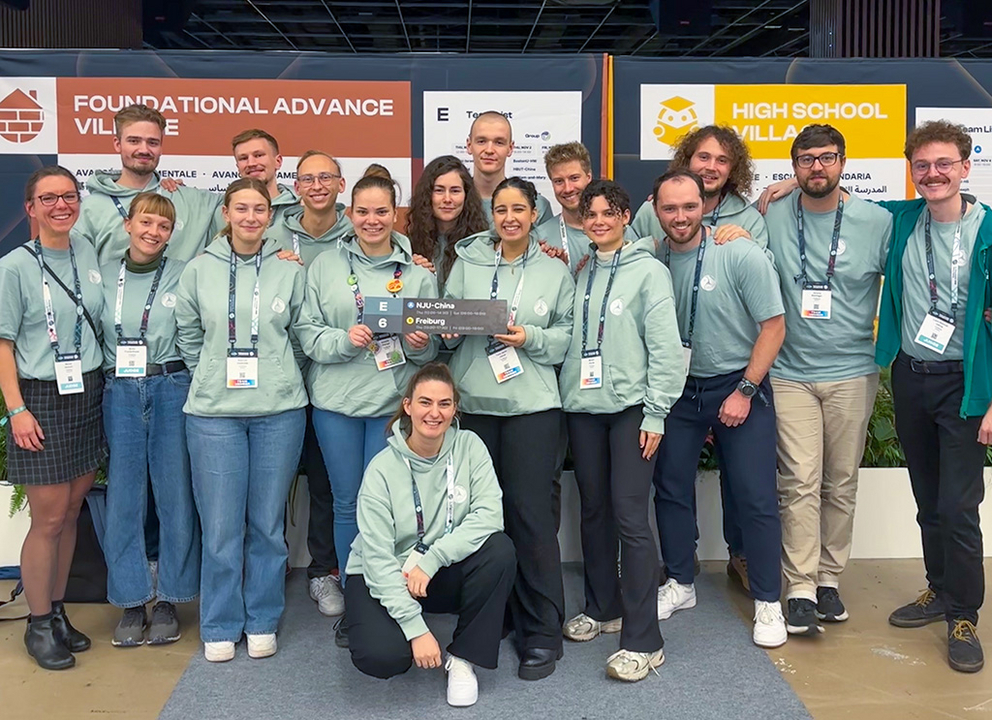
The iGEM team Freiburg and supervisors at the iGEM 2023 Grand Jamboree. Back row, left to right: Konstantin Jäschke, Michael Spädt, Kevin Postol, Anna Indricane, Benjamin Vogt, Andreas Riedl-berger, Jonathan Kühfuß, Jeremy Ranniger, Leon-Samuel Icking. Middle, left to right: Nicole Gensch, Anne Smedegaard Frederiksen, Hannah Swientek, Amelie Stange, Yara Jenin Jamal, Miriam Denda, Jonas Pleyer. In front, kneeling: Melita Dyla. Picture: iGEM Team Freiburg 2023
Our Project: CELLECT
CELLECT is a blend of the words ‘cell’ and ‘select’, a good summary of the application: we want to select the exact bacterial cells which will produce the desired product in the process of genetically engineered production of certain molecules. This poses a real industrial issue: the bacteria that don’t produce the product require less energy and therefore reproduce more quickly. These fast-growing bacteria suppress the more productive ones in the bioreactor. The conventional method of using antibiotics to direct the selection and multiplication of productive bacteria is oftentimes not sufficient.
Our solution is a self-regulative system we can transfer into bacteria that links the survival of the single bacterium to the actual production of the desired output substance. The system works as a kill-switch, which is automatically activated by a halt in production – for example, if the gene for the product is lost or defect. In this manner, only the productive cells are ‘CELLECTed’.
Thus, we use a specific ‘Riboswitch’ (an mRNA sequence), which recognises the product and connects it to a toxin/antitoxin system. It leads to the selection of only productive bacterial cells. Theoretically, this system can be employed for all kinds of substances which are to be produced. We have decided on the production of the essential B12 vitamin.
We had about a year’s time for the realisation of the described project as part of the competition, as well as presenting the concept convincingly in lectures, presentations and on our project website.
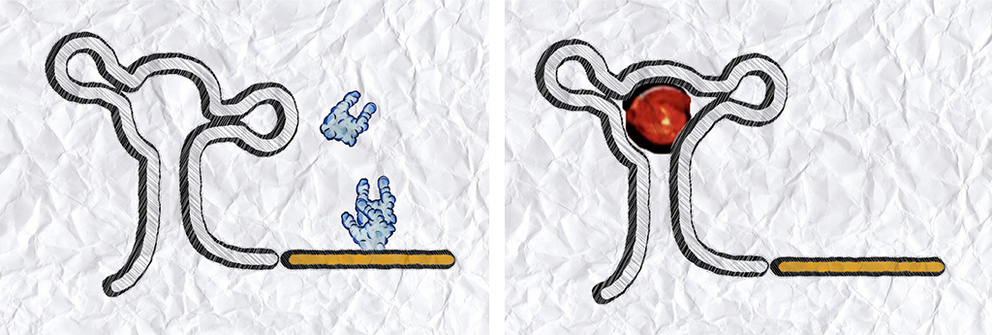
Simplified depiction of CELLECT. The Riboswitch (grey) is linked upstream of a toxin-gene (orange). Left: If the desired product (red) is present, nothing happens. Right: If the bacterium is not produc-tive anymore, a toxin (blue) is assembled. Illustration: Yara Jenin Jamal and Michael Spädt
This is how it went: The iGEM Grand Jamboree in Paris
We all took the train from Freiburg to Paris together. The first day of the Jamboree started with a welcome ceremony where sponsors and partners of the iGEM competition introduced themselves – afterwards, we continued with the official parts of the finale.
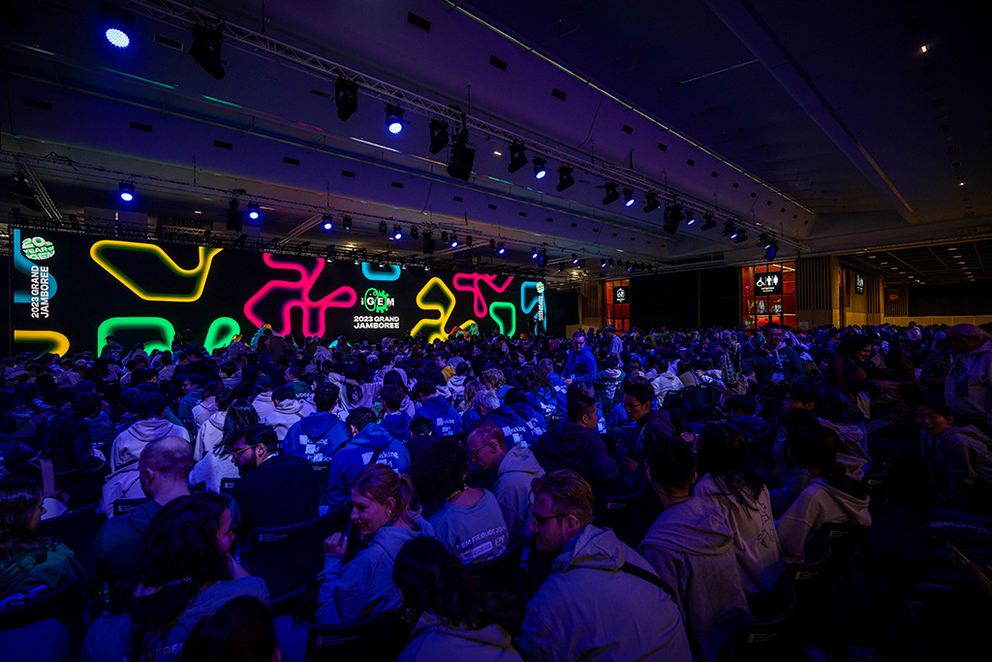
The auditorium at the iGEM Grand Jamboree 2023. Picture: iGEM Foundation, CC BY 2.0 DEED
We had previously received a schedule with our judging session – we were up directly after the welcome ceremony. So, we gathered in front of the room, ready to pitch CELLECT to the jury.
A few technical difficulties at the beginning were quickly resolved and we could continue focusing on our pitch and the specific questions of the jury. The initial nervousness quickly made room for a calming feeling as we realised that the jury was just as excited about CELLECT as we ourselves were.
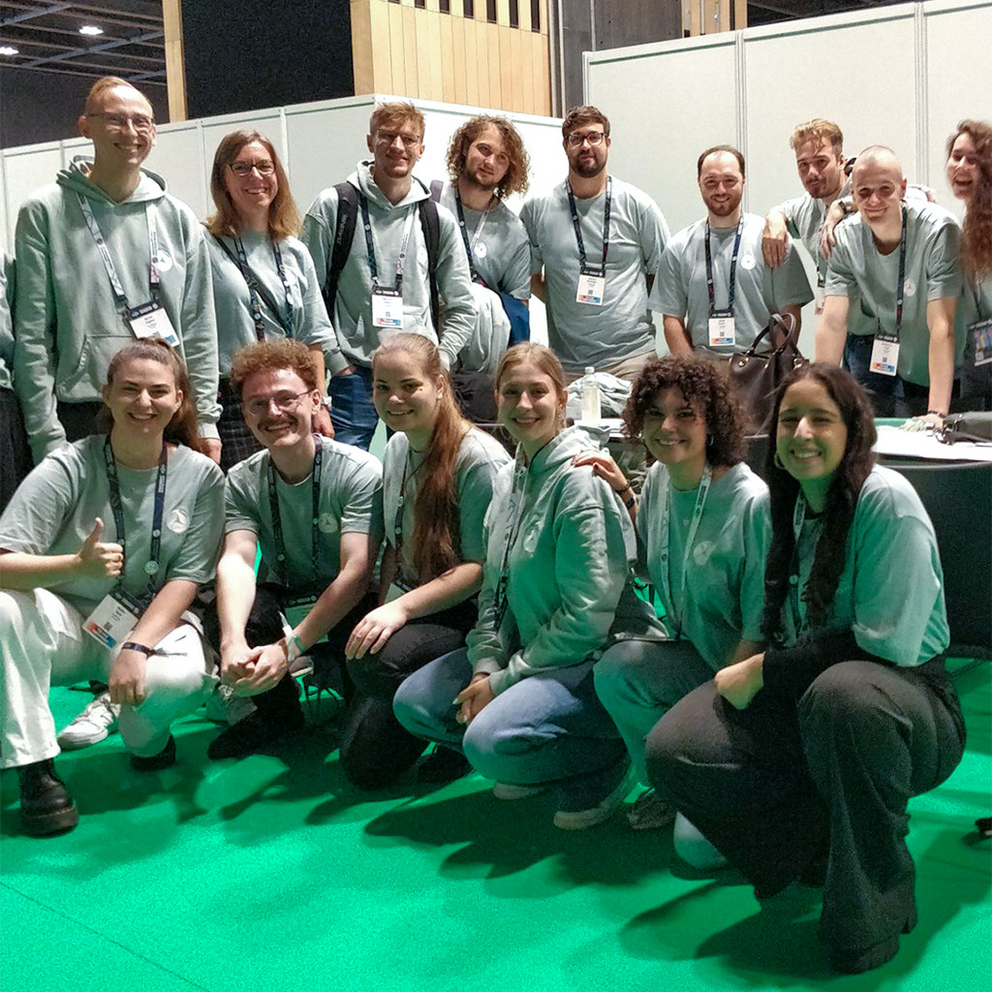
The iGEM team Freiburg right before the judging session. Picture: iGEM team Freiburg 2023
For the afternoon and the following day, we were assigned an information stand where we could present CELLECT to everyone interested in listening and discussing the future of the system; it is our goal to improve CELLECT as a universal autoregulatory system to the extent of making it available for all sorts of products and organisms.
We took turns at the stand so we could get to know the other teams and companies from all over the world.
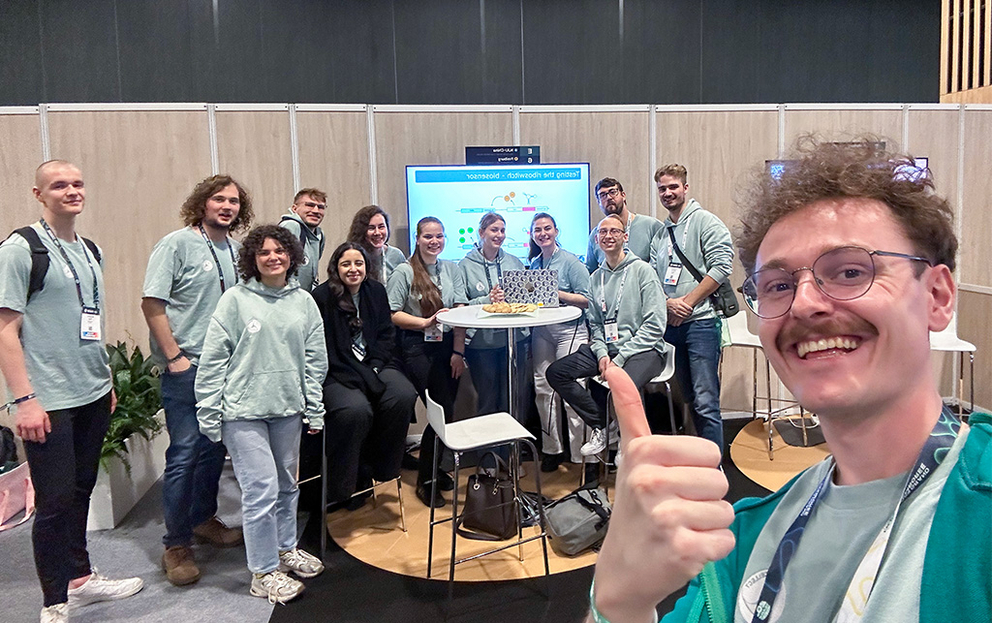
The stand of the iGEM team Freiburg at the Grand Jamboree in Paris. Picture: Leon-Samuel Icking
On the third day of the Jamboree, we presented CELLECT at the so-called ‘Plaza Presentation’ in front of a full audience. Once again, a chance for the jury to get a picture of the project and ask more questions. The atmosphere was great and the excitement of the audience towards CELLECT was worth every hurdle we had struggled with in the lab beforehand.
The hard-earned awards were given out on the concluding day. We received a gold medal for special excellence and landed a spot in the Top 10 of Overgraduate Teams (those with at least one member either over the age of 23 or with a finished university degree). We still cannot believe how much we’ve achieved! An absolute triumph for us. Additionally, we were also nominated for the categories ‘Best Foundational Advance Project’, ‘Best New Compostive Part’, and ‘Best Wiki’ (best website).
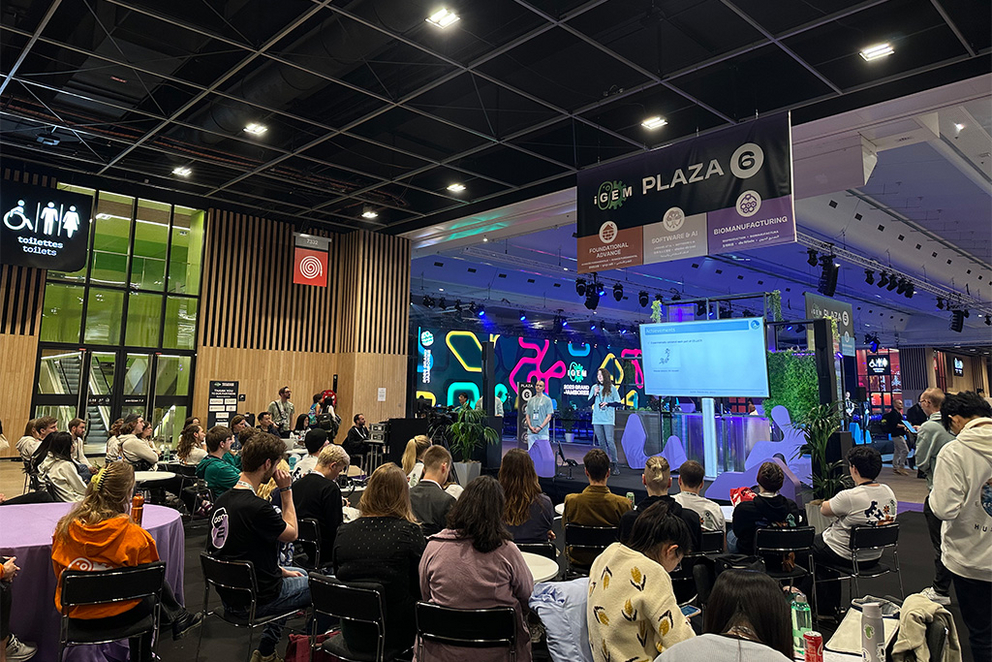
The iGEM team Freiburg during the Plaza Presentation. Picture: Melita Dyla
Conclusion and Acknowledgements
The participation in the iGEM competition was an exciting and emotional journey with a few lows, but predominantly defined by highlights. Especially the helping hand of our project leader Dr. Nicole Gensch of the ‘Signalling Factory’ at the University of Freiburg and the support of our supervisors Anne Smedegaard Frederiksen, Jonas Pleyer, Michael Spädt, Leon-Samuel Icking, Andreas Riedlberger, Nikita Edel, and eremy Ranniger, most of whom still are students themselves and were part of last year’s iGEM team, were indispensable to us. Last year’s iGEM team also took home a gold medal and the price for ‘Best Foundational Advance Project’ and shared their experiences and motivation for creative research with us. Thank you!
Our cooperation with Prof. Dr. Annegret Wilde, Prof. Dr. Wolfgang R. Hess, Jun-Prof. Dr. Khaled Selim and PD Dr. Luciana Hannibal from the University of Freiburg was crucial for the conception of CELLECT.
We also want to give special thanks to CIBSS and BIOSS for both the financial support and access to the lab. The unfathomable knowledge we received from members of CIBSS and BIOSS and further professors at the University of Freiburg proved to be invaluable. Furthermore, the sense of community and support in this research field that was so freely conveyed, motivated and encouraged us throughout the whole project.
The opportunity to represent the University of Freiburg and the signalling research centres CIBSS and BIOSS on an international platform was an honour.
We look back on our achievements with pride and wish the future iGEM teams of the University of Freiburg to experience just as much fun and enthusiasm to advance synthetic biology as we did.
FURTHER INFORMATION ON IGEM AND THE 2023 IGEM TEAM FREIBURG
CELLECT websiteCELLECT promotional video
Website of iGEM competition
About iGEM
This year, iGEM celebrates its 20-year anniversary. The competition, which was called to life by MIT in Cambridge, USA, is now an international event with 400 participating teams from over 50 countries this year alone.
The teams of high school and university students independently develop methods of synthetic biology for solving real-world problems. Since 2007, over 20 teams from the University of Freiburg have participated. This year’s team was funded by the Excellence Cluster CIBSS – Centre for Integrative Biological Signalling Studies, the scientific centre BIOSS – Centre for Biological Signalling Studies, the faculty of Biology, and the faculty of Chemistry and Pharmacy of the University of Freiburg. Further support was received from the iGEM – Impact Grant, Roche, the Sparkasse Freiburg im Breisgau and the following sponsors: SnapGene, New England Biolabs, Carl Roth Gmbh & Co. Kg, Bio-Rad, Microsynth AG, Demeditec Diagnostics GmbH, Integrated DNA Technologies, Greiner Bio-One, CellDEG, Tebubio, Macherey-Nagel, Labor LS SE & Co. Kg, Zymo Research Europe GmbH.



